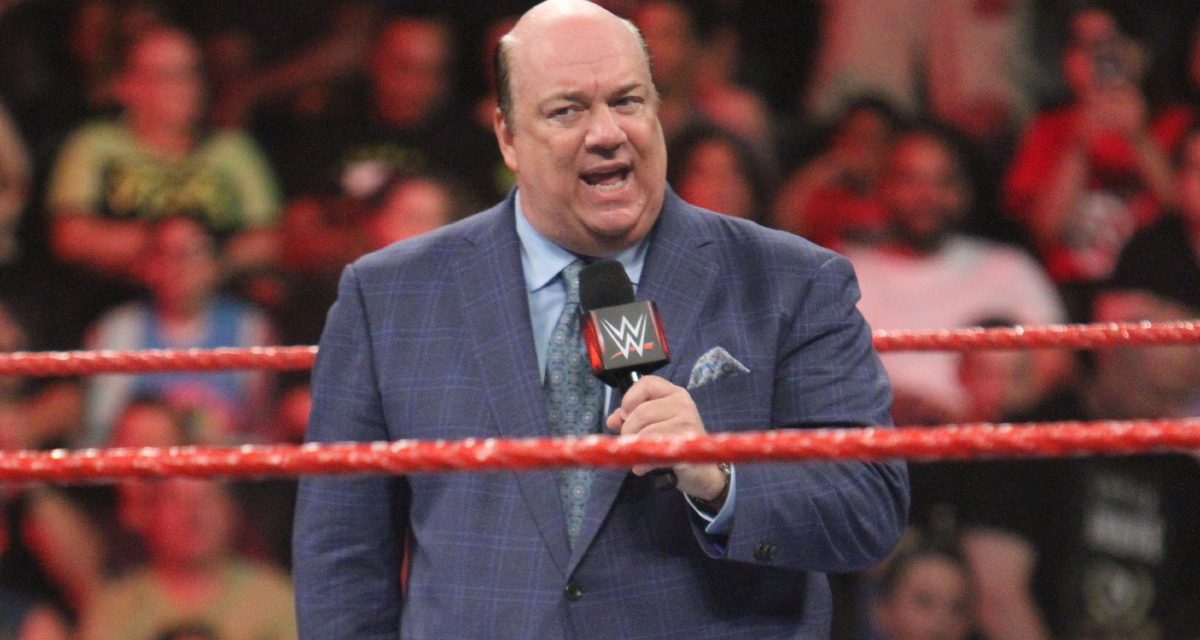“Everyone becomes a part of history whether they like it or not and whether they know it or not.”
— Philip Roth
Seeing the majestic structure of the United Nations in New York City, one can only be inspired by its shiny exterior of hope. With the colourful flags of the world and a beautiful globe structure, it seems to be a welcoming place. But when one enters it, a harsher reality of the world is seen: a large tent is placed outside, full of security and police officers, and everyone is subject to a security search that is far more thorough than one would experience in an airport. Despite that, the UN remains open to the public, in defiance of those who would wish it closed.
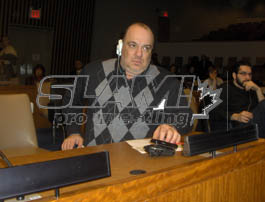
Paul Heyman at the Holocaust Remembrance at the United Nations. Photo by Ranjan Chhibber.
The person accompanying me to the UN is perfectly suited to be in this building, as he is a man who has fought for cultural justice and racial harmony his whole life in an industry that is rife with intolerance and prejudice, against insurmountable odds. His name: Paul Heyman.
It is January 27, 2009, and the International Day of Commemoration in Memory of the Victims of the Holocaust. Heyman took SLAM! Wrestling on a tour of the UN prior to the solemn event, while explaining the importance of his Jewish heritage to his life. While he says he is “as liberal as it comes” when it comes to his synagogue attendance, and certainly does not keep kosher, he is proud of his culture and reveals that he is a keen student of the struggles of the Jewish people over the ages.
The fact that a young Jewish kid could break into the wrestling business, and rise as quickly as he did is a miracle in and of itself. He would say things like “oy vey” and talk about his “Uncle Moishe the Peeping Tom” while doing commentary with Jim Ross in WCW, and went to become the most influential Jewish wrestling promoter in the late 20th century.
Heyman’s life parallels the journey of the archetypal hero as described by the renowned scholar, Joseph Campbell, in his “Hero With a Thousand Faces”: Campbell says that a hero is not born as such, but begins his life in an ordinary way, and only starts his journey to heroism when entering a strange and different world. For Heyman, that world was the world of wrestling.
AWARENESS OF HIS PAST
“There is someone missing. Is it I who am missing?”
— “To the Six Million,” by Irving Feldman
As we are seated for the Holocaust Remembrance at the UN, we see an ocean of diversity coming to pay respects to the victims of humanity’s greatest tragedy and disgrace. The normally animated Heyman becomes subdued, perhaps for the first time since this reporter has known him. It should be noted that this was the first time in many time in many years Heyman had attended this ceremony. He felt a special obligation to attend this year, because his mother Sulamita Heyman, a survivor of the Auschwitz and Bergen Belsen death camps, was in the hospital battling cancer; both of them attended the very first such event at the UN in 2006.
“I wish I could find the words to accurately describe the holy obligation carried by the first generation of children of Holocaust Survivors. It’s not a religious thing. It’s EVERY thing,” Heyman explains. “The most influential moment of my life actually happened 20 years before I was born, when the British soldiers liberated Bergen Belsen on April 15, 1945.”
As the ceremonies begin, Heyman places a translator on his ear, looking more the diplomat than the wrestling promoter, and I realize that this is the real Paul Heyman. Not Paul E. Dangerously, the promoter, but Paul Heyman, the son of a Holocaust survivor, who fought a largely ignored battle against racism in the profession of his choice.
His tone is almost reverential, as if his next words are something of Holy Scripture, revealing the heartbreaking and yet heroic struggle of his mother: “After being liberated, my mother lived her entire life as if she carried the souls of her younger sister and her mother, who went to the gas chambers in Auschwitz,” Heyman stated. “Everything my mother has done with her life, she has done with their spirits in mind.”
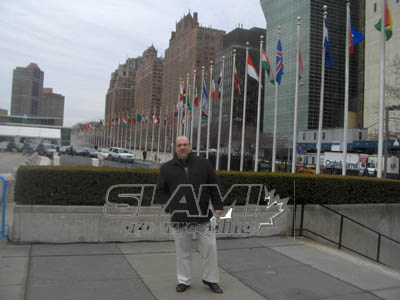
Paul Heyman outside the United Nations building in New York City. Photo by Ranjan Chhibber.
Heyman never forgets that both faith and fate played equal parts in him being alive today. It was his mother’s fate that she survived the death camps that took the lives of countless innocent people and it was her faith, which she clung to in the bleakest of hours, that kept that dwindling spark of life alive.
When Major Leonid Rozenberg (Ret.), a former Soviet officer who helped liberate a Nazi concentration camp, gives a powerful speech, Heyman offers him a standing ovation. “While many people know my father is a lawyer, what gets forgotten is that he was in the U.S. Navy in World War II,” he revealed. “My father served on the USS Rescue (AH-18) in the Pacific.”
For the first time in this reporter’s nearly five-year friendship with him, I see his eyes become wet after some speeches discussing the horrors of the Holocaust and those that survived it. But ever the tough guy from the world of wrestling, when he noticed me catching a glimpse of this, he turned away and would resume his stoic disposition.
2009 HALL OF FAME OR HALL OF SHAME?
“False face must hide what false heart doth know.”
— Macbeth
When the keynote speaker, Rabbi Yisrael Meir Lau, takes the stage, we remove our earpieces as he speaks in English. The Rabbi’s words are meant for all, telling all listeners to stand up against anti-Semitism and Holocaust denial whenever and wherever they hear it.
After the Rabbi’s speech, I asked Heyman when he first experienced anti-Semitism in his life. It wasn’t in high school or in the clubs he would attend. “It was only when I entered the wrestling world that I experienced my first anti-Semitic remarks,” he said.
Heyman was also quick to point out that he is not a prude, and knows the difference between friendly ribbing and out-and-out racism. “I was always chided that it’s against my religion to pick up the tab for lunch or dinner,” Heyman said, “but I never took offense to it. There’s a difference between joking about a stereotype and blatant bigotry.”
Heyman says his first true encounter with brutal anti-Semitism was an encounter with legendary booker “Cowboy” Bill Watts, who the WWE has chosen to be inducted in its 2009 Hall of Fame, just a few short months after America elected its first African-American President.
“I’d never met Watts before,” Heyman recalled with a terse lip. “The first time I met him was when he became the head of WCW. We weren’t two minutes into our conversation when he asked me where my beanie was [referring in an offensive way to a yarmulke]. He then started comparing me to a manager back in the day called Izzy Slapowitz.”
Heyman half-laughed, “I could see we were really going to get along just great!”
According to Heyman, he says this was the first of numerous anti-Semitic remarks he had to endure while working for Watts.
“After a televised wrestling show, the ratings came in, and Watts was livid,” Heyman remembered. “This was during the storyline with Madusa [Miceli]. Our segment was the highest rated segment of that program … and Watts says — in front of a room full of people — how pissed off it makes him that a Jew and a c— drew the highest rating of the show. He felt it was the downfall of the wrestling business.”
However, others believe Heyman’s assertions are no longer valid, and that Watts has since recanted all of his controversial views. For example, in Scott E. Williams’ detailed and well-written autobiography of Watts’ life, The Cowboy and the Cross, it is said that Watts is a changed man, thanks largely to his becoming a born-again Christian.
On the subject of Watts being inducted into the WWE Hall of Fame, Heyman himself has an admittedly mixed opinion of his former WCW boss. “On one hand, it’s shameful that such a known racist should be rewarded at all!” Heyman stated, slamming some utensils on the table in anger. “In a business where ruthlessness is expected and insensitivity rules, Bill Watts was as contemptible a being as I’ve ever met.”
“However,” Heyman continued, “the Hall of Fame is not about your contributions to humanity. They are about your contributions to the professional wrestling industry, and Watts certainly left his mark. Ty Cobb was a known racist, and he belongs in the Baseball Hall of Fame. This is not a testament to his humanity; it’s an acknowledgment of his accomplishments in the field of sports entertainment.”
Watts’ own words in a SLAM! Wrestling interview earlier this week seem to indicate that he is a humbler man than when Heyman knew him. “Life is like an anvil, we are formed on this anvil of life and it has been an interesting one,” mused Watts.
Yet Heyman is recalcitrant: “Maybe Michael Hayes can script the Cowboy’s induction of Mark Henry one day.”
HEYMAN’S EXODUS FROM THE WWE
“To remain silent is the greatest sin.” — H.E. Ambassador Gabriela Shalev, Permanent Representative of Israel to the United Nations. Address at the 2009 International Day of Commemoration in memory of the victims of the Holocaust.
After the event at the UN, Heyman and I go to the world famous Carnegie Deli for lunch in midtown Manhattan.
At my request, Heyman orders our meal for us, and reveals his genius as a menu-booker too: the dishes are all scrumptious, including latkes and borscht.
Over lunch, more than a few people approach him and ask him for his autograph. He signs every one of them graciously, taking the time to say thank you for their kind words, shaking hands with each person who asks for his signature.
When asked if he experienced anti-Semitism during his tenure in the WWE, Heyman says very rarely, but it did happen.
This was a surprise to a man who tried to keep the working environment in the ECW locker room as far away from that mindset as possible. Regrettably once he left the camaraderie of ECW and entered the WWE, it made him see the business through another set of eyes.
He cites an example of a now-famous behind-the-scenes story about going to straight to WWE Chairman Vince McMahon and Executive Producer Kevin Dunn on McMahon’s private jet and protesting the lax attitude towards Raw color commentator Jerry Lawler’s remark on a broadcast, “Judo? I thought that’s what bagels are made of.”
One wonders if Heyman was directly confronting one of those two men, since it is widely known that the WWE Announcers are allowed very little latitude when it comes to ad-libbing lines. They are fed the lines, and who exactly would have fed The King this line is anyone’s guess.
But regardless of who was responsible for that phrase, Heyman said, while enjoying his pastrami on rye, “You have to take into account that by its very nature, pro wrestling is sometimes about the exploitation of the very stereotypes so many people can sometimes be offended by. There are indeed times when a line is crossed, and those affected by the offense must step forward and say something about it, or the parameters will forever be moved too far to be reigned in.”
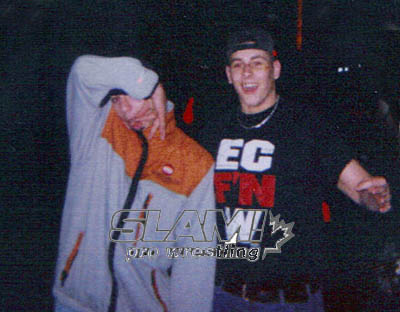
Colt Cabana with an ECW t-shirt on at an ECW event as a teen.
Other Jewish wrestlers SLAM! Wrestling contacted refused to on the record about hearing anti-Semitic remarks during their professional wrestling careers. One who did go on the record about this is arguably one of the most talented American wrestlers today, Colt Cabana, who recently parted ways with the WWE, where he was known as Scotty Goldman.
After being convinced by mutual friend, Sonjay Dutt, Cabana gave SLAM! Wrestling his first post-WWE-release interview. He said over the phone that Paul Heyman’s ECW was a big influence on him becoming a wrestler. “Paul E.’s success helped me prove the point to my family that another Jew had succeeded in the world of wrestling, and that I didn’t have to become a doctor or lawyer like everyone else [in our Jewish social circle].”
But like his role model, Cabana also described similar experiences Paul E. had as a minority in the world of wrestling. Cabana says, “When I was in OVW, one of my WWE trainers called me ‘Kike Cabana,’ in front of everybody! I looked at him like he was some kind of moron. It was one of the most ignorant things anyone could ever do. I’ll never forget that.”
Cabana concluded, with a great deal of anger, “the WWE is part of corporate America, and for [one of their employees] to call me ‘Kike Cabana’ in front of everybody was one of the most anti-Semitic things I’ve ever experienced.”
Heyman isn’t surprised by any of this. He also offered this analysis of some troubling trends in the world of wrestling: “On WWE 24/7, they recently had two blatant racists talking about the importance of African American wrestlers,” he uttered with disgust. “I am sure this was lost on a lot of people, because there’s no way Vince [McMahon] would have allowed that scheduling if someone brought it to his attention. The problem is that there are people in a position to say something to Vince, but they don’t care enough to say something because it doesn’t affect them personally.”
Heyman says that particular 24/7 was a disgrace. “They might as well have had a cross burning in the background during that roundtable!”
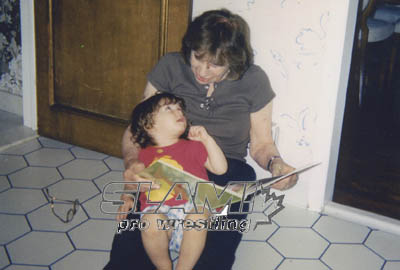
Paul Heyman sent in this photo to share with SLAM! Wrestling readers: “It’s my Mom (Sulamita Heyman) teaching granddaughter Azalea Heyman how to read at age 2.”
A NEVERENDING BATTLE
“If there is no struggle, there is no progress.”
— Frederick Douglass
Enthralled by Heyman’s tale, it is nearly dessert time, and I have only half-eaten my tasty meal. Heyman says, like a doting father, “Take a bit of break, and enjoy this great food, Ranjan.”
Before returning to my meal, I asked Heyman if he misses standing up for the oppressed in the world of wrestling. “I don’t think I’m some voice of the beleaguered and downtrodden,” Heyman said, “but when I hear something that would cause my mother to take notice, I know it’s time to speak up.”
Heyman said the struggle against injustice is never over, no matter what field of life one is in. This reporter remembers watching Heyman try to explain to Vince McMahon one night on the corporate jet why noted author and renowned professor Cornel West (whose books were always in Heyman’s briefcase) was such a fascinating character, despite his rather controversial views. “There’s a balance that’s out there,” Heyman pontificates, “it’s very hard to find. Obama isn’t just the first African-American President of the United States — he is the right man for the job. The equality and progress he brings along with him is a major step, but only achieved because he was best suited for the task at hand.”
Main event wrestlers from the top American companies continue to call him for support, and even though he has left that world behind him, he tries to help them. During our lunch, at least two current wrestling superstars were texting him for advice.
And when his children are old enough, he will pass on the knowledge of their tragic and yet extraordinary legacy to them. Heyman has completed Joseph Campbell’s hero journey, now entering the phase of the “Return,” as Campbell dubbed it: Heyman has returned from his journey in a strange world, scarred but victorious, bestowing his knowledge on future heroes and heroines.
As Cabana revealed, the same problems Heyman faced with anti-Semitism and racism are still inherent in the wrestling business. But both men are to commended for not being silent, when so many others in their profession are.
We finish our meal and leave the deli. I asked Heyman if I might be able to interview his mother. Heyman offers, “Bring the article to her in person once it’s published.”
We say our goodbyes, and after learning so much about her extraordinary son, this reporter looks forward to the day when he will meet Heyman’s mother.
EDITOR’S NOTE: Paul Heyman’s mother, Ms. Sulamita Heyman, passed away on February 27, 2009, at the age of 81, three weeks before the completion of this article. Everyone at SLAM! Wrestling sends our condolences to Paul E. and the rest of his family. Ranjan Chhibber dedicates this article to Sulamita Heyman’s memory, and hopes he will have the privilege of being in her presence one day. That is a story worth waiting for.
RELATED LINKS
